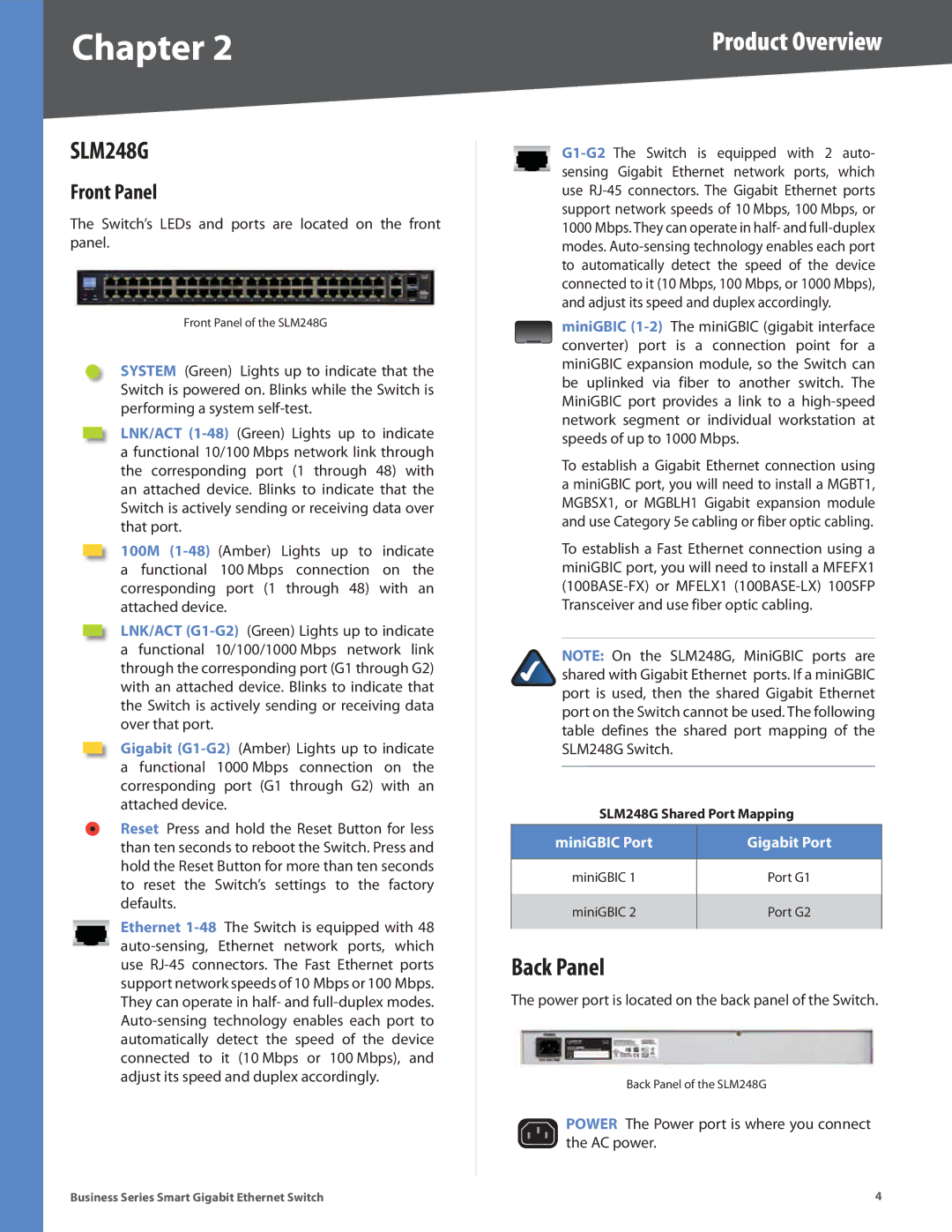SLM248G
Front Panel
The Switch’s LEDs and ports are located on the front panel.
Front Panel of the SLM248G
SYSTEM (Green) Lights up to indicate that the Switch is powered on. Blinks while the Switch is performing a system self-test.
LNK/ACT (1-48) (Green) Lights up to indicate a functional 10/100 Mbps network link through the corresponding port (1 through 48) with an attached device. Blinks to indicate that the Switch is actively sending or receiving data over that port.
100M (1-48) (Amber) Lights up to | indicate |
a functional 100 Mbps connection | on the |
corresponding port (1 through 48) with an attached device.
LNK/ACT (G1-G2) (Green) Lights up to indicate a functional 10/100/1000 Mbps network link through the corresponding port (G1 through G2) with an attached device. Blinks to indicate that the Switch is actively sending or receiving data over that port.
Gigabit (G1-G2) (Amber) Lights up to indicate a functional 1000 Mbps connection on the corresponding port (G1 through G2) with an attached device.
Reset Press and hold the Reset Button for less than ten seconds to reboot the Switch. Press and hold the Reset Button for more than ten seconds to reset the Switch’s settings to the factory defaults.
Ethernet 1-48 The Switch is equipped with 48 auto-sensing, Ethernet network ports, which use RJ-45 connectors. The Fast Ethernet ports support network speeds of 10 Mbps or 100 Mbps. They can operate in half- and full-duplex modes. Auto-sensing technology enables each port to automatically detect the speed of the device connected to it (10 Mbps or 100 Mbps), and adjust its speed and duplex accordingly.
G1-G2 The Switch is equipped with 2 auto- sensing Gigabit Ethernet network ports, which use RJ-45 connectors. The Gigabit Ethernet ports support network speeds of 10 Mbps, 100 Mbps, or 1000 Mbps. They can operate in half- and full-duplex modes. Auto-sensing technology enables each port to automatically detect the speed of the device connected to it (10 Mbps, 100 Mbps, or 1000 Mbps), and adjust its speed and duplex accordingly.
miniGBIC (1-2) The miniGBIC (gigabit interface converter) port is a connection point for a miniGBIC expansion module, so the Switch can be uplinked via fiber to another switch. The MiniGBIC port provides a link to a high-speed network segment or individual workstation at speeds of up to 1000 Mbps.
To establish a Gigabit Ethernet connection using a miniGBIC port, you will need to install a MGBT1, MGBSX1, or MGBLH1 Gigabit expansion module and use Category 5e cabling or fiber optic cabling.
To establish a Fast Ethernet connection using a miniGBIC port, you will need to install a MFEFX1 (100BASE-FX) or MFELX1 (100BASE-LX) 100SFP Transceiver and use fiber optic cabling.
NOTE: On the SLM248G, MiniGBIC ports are shared with Gigabit Ethernet ports. If a miniGBIC port is used, then the shared Gigabit Ethernet port on the Switch cannot be used. The following table defines the shared port mapping of the SLM248G Switch.
SLM248G Shared Port Mapping
miniGBIC Port | Gigabit Port |
| |
miniGBIC 1 | Port G1 |
miniGBIC 2 | Port G2 |
| |
Back Panel
The power port is located on the back panel of the Switch.
Back Panel of the SLM248G
POWER The Power port is where you connect the AC power.

